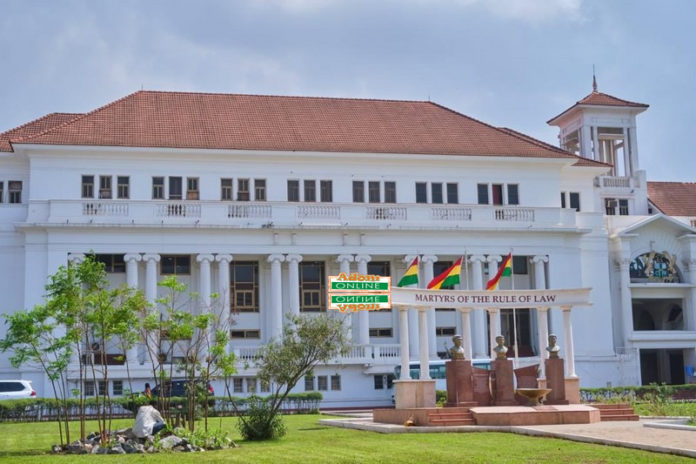The Supreme Court is set to rule on Richard Dela Sky and Dr Amanda Odoi’s application for interlocutory injunction against the transmission of the anti-LGBTQ bill to the presidency by Parliament.
The 5-member panel, chaired by Chief Justice, Getrude Torkornoo will not undertake a composite ruling.
The panel is expected to determine today, Wednesday, July 17, whether to bar Parliament from transmitting the bill to the presidency for his assent or otherwise.
The panel, at the application hearing stage comprised Justice Mariama Owusu, Justice Prof Henrietta Mensa-Bonsu, Justice Ernest Gaewu, and Justice Yaw Darko Asare.
In the first case titled Dr Amanda Odoi vs. the Speaker and Attorney General, Lawyer for the applicant Ernest Arko, argued that both the Speaker and the Clerk to Parliament should be restrained by the Apex Court until after the determination of the substantive matter.
He contended that irreparable damage and harm would be inflicted on the applicant if the interlocutory injunction is not granted, while the Speaker would not suffer if it is refused.
The Plaintiff, who is seeking the apex court to declare the bill null and void, also argues that the passage of the bill violates provisions of the 1992 Constitution particularly Article 33(5) as well as Articles 12(1) and (2), 15(1), 17(1) and (2), 18(2), and 21(1) (a) (b) (d) and (e).
Attorney General Godfred Yeboah Dame indicated that the bill should not have been entertained in Parliament in the first place.
His contention was that it was in violation of Article 108 of the 1992 constitution which states that Parliament shall not, unless the bill is introduced or the motion is introduced by, or on behalf of, the President: proceed upon a bill, including an amendment to a bill, that, in the opinion of the person presiding, makes provision for any of the following; the imposition of taxation or the alteration of taxation otherwise than by reduction; the imposition of a charge on the Consolidated Fund or other public funds of Ghana or the alteration of any such charge otherwise than by reduction; or the payment, issue, or withdrawal from the Consolidated Fund or other public funds of Ghana of any money not charged on the Consolidated Fund or any increase in the amount of that payment, issue, or withdrawal.
He opined that, “what the (Supreme) Court ought to look at in granting an application for interlocutory injunction is whether substantial questions of law have been raised by the plaintiff.” To him, the conditions precedent for entertaining the bill in parliament was not met, and anything done about the bill should be declared a nullity.
In opposing the application, lawyer for the Speaker, Thaddeus Sory, argued that no violation would be inflicted on the applicant if the request is refused. He said the application is a repetition of what had been put before the court earlier by the applicant, and the court should not place any weight on such an application. He contends that process hasn’t ended, and thus injuncting parliament from transmitting the bill to parliament would be usurping the powers of the legislature.
In the case of broadcaster and lawyer, Richard Dela Sky, his counsel, Paa Kwesi Abaidoo, pointed to the absence of fiscal impact analysis, which formed the basis for the passage of the bill.
Among the reliefs sought in Richard Sky’s writ is an order to restrain the Speaker of Parliament and the Clerk to Parliament from presenting The Human and Sexual Values Bill, 2024, to the President for his assent.
The plaintiff is also seeking an order to restrain the President from assenting to The Human and Sexual Values Bill, 2024, arguing that such action would directly contravene the constitutional safeguards protecting the liberties and rights of Ghanaians.
Attorney General Godfred Yeboah Dame argued that the bill ought to be stayed until the final determination of the substantive suit.


